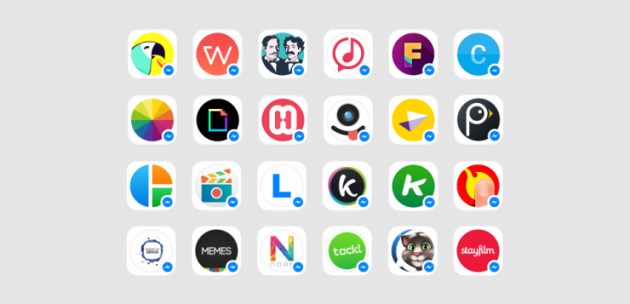Facebook Messenger Adds Free Video Calling and Third-party Apps Integration
Zuckerberg just won't accept mobile users choosing other apps over Facebook Messenger [Google Play, iTunes, Windows Store], so in a move to encourage the multimillion Facebook audience to use Messenger again, Facebook is beefing up its app with a slew of bells and whistles. As if acquiring WhatsApp with its multi-million user base is not a strong enough extra grasp over your personal information.
Third-party apps integration
First off, the company has rolled out a support for third-party apps integration with the Messenger. Now you can send your messages with GIFs, stickers, music and other beautifying tricks. The app developers have expressed excitement over the opportunity to make their apps compatible with Facebook Messenger. Now, if someone sends you a message containing a smiley your Messenger does not recognize because you don't have the corresponding add-on, you will be offered a link to read about and install the missing app to let your Messenger display the smiley correctly. Now I will brace myself before initiating a chat with my cousin because she is an avid fanatic of all these cute and pink things plastered all over her messages. In other words, the two-faced Janus of third-party app integration may eventually turn into regular spamming users unwilling to install these apps from the other, less conservative users.
Of course, a smiley is a simplification of what the third-party apps allow the users do via the Messenger. As of now, there are 40+ third-party apps signed up for the integration. Use Giphy to send GIFs; Ditty [iTunes, Google Play] turns your short 70-character messages into custom versions of the popular songs; Selfied [Android, iOS] lets you replace emoticons with a picture of your precious self; Sound Clips [Android, iOS] lets you attach sound clips to your messages, like the crowd laughter or a disapproving sound; Shout! [Android, iOS] lets you take an image, attach a few words and have the app send it to the recipient in all CAPS; Strobe [Android, iOS] is another GIF creator, only by Facebook itself, offering a slew of features and effects.
One for the businesses
Then there is the business integration – the business chats that let customers communicate with the companies directly over a variety of issues from tracking an order to sending payments. As of now, this feature is limited to a few select countries with the aim to widen the coverage.
Video-calling
That's not all, yet. A few days ago, Facebook rolled out the video calling feature to Messenger, a feature somewhat overdue, yet probably welcome by the Facebook crowd of users. Now, Android users can video-call iOS users and Windows Phone users, and all the other way around. It is free and will only cost you if you are using Messenger when on data plan, whereas when on WiFi it really is free.
As of now, the feature is available in 18 countries, including the USA, Canada, Belgium, Croatia, Denmark, France, Greece, Ireland, Laos, Lithuania, Mexico, Nigeria, Norway, Oman, Poland, Portugal, the United Kingdom and Uruguay. More countries will be added in the next few months.
Desktop Facebook users cannot currently video call mobile users, a problem that will be patched soon, according to Facebook's Stan Chudnovsky. Messenger now accounts for 10% of mobile VOIP calling, and with the advent of the face-to-face video calling, Facebook aspires to widen the coverage.
Cold video calling on Facebook? Telemarketers galore
The tricky part is the etiquette, and here is why. As of now, you will see a video-call icon whenever you are online in your chat, and anyone on your chat list is able to video-call you. How you handle the new opportunities – with a warm welcome or cold rejection depends on who's calling you, but it also adds an extra cap of awkwardness to the already awkward enough Facebook-made friendships. Ah well, iOS users have learned to live with the FaceTime, which basically offers the same functionality, but to an iOS-limited audience.
Pros
Now, Messenger competes with Skype, the mentioned FaceTime and Google Hangouts. Messenger’s algorithm allows it to notify you, when you are chatting, that you can switch to video-calling when on Wi-Fi. It can also suggest one of the two parties revert to audio calling in favor of the other party's video-call bandwidth. For example, when you are home or at the office and your friend is on Barbados, your friend should be the one showing off the visuals.
As you can see, even though Messenger is one of the last to join the party, its main advantage is that literally everybody is on Facebook one way or another.
Cons
All the Messenger's bells and whistles aside, Facebook remains one of the resource hungriest apps on mobile, often causing bandwidth and battery drain on mobile devices. However, even that is not the reason to feel wary about it. Edward Snowden's files are the reason you should be re-considering your social networking behavior, but then again, Snowden's revelations won't help you unless you are willing to help yourself.

